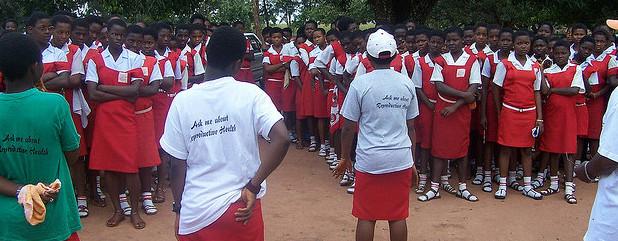Too many dreams deferred: Nigeria needs to overhaul its education system

Nigeria’s exam-based education system is failing its students. Buhari needs to make reform of it a priority.
A few days ago, I read Langston Hughes’ poem “˜Harlem‘ and it made me think about the deferred dreams of millions of young Nigerians. Dreams that were once so close that they gripped our imaginations, shaped our choices, and propelled us forward – and yet so far away and out of reach that most of us abandoned them while still in our teens. “What happens to these deferred dreams?”
Are they tossed out like garbage on the Third Mainland Bridge? Or are they packed into bombs and detonated in bus parks and crowded markets, erasing other once-promising dreams? Are they exchanged at churches and mosques for unquestioning religious fanaticism? Or are they traded in for membership in militant groups, such as Boko Haram, and unleashed as the terror in Baga and Chibok? Are they printed neatly onto visa application forms at foreign embassies and folded into excess luggage headed for America, London or even Ukraine and Ghana, where they take on new identities and accents?
Lately, I’ve come to believe that most dreams are simply left behind in the sweltering heat of Nigeria’s examination halls.
In August, the West African Examination Council (WAEC), which administers the biannual West African Senior School Certificate Examination (WASSCE), released the results of the May/June examinations. As expected, the results were depressing – a long list of disappointments.
Only 39% of the 1,593,442 students who did the exam passed. And that’s not all. About 200,000 students did not get any results at all, their futures suspended by a broken bureaucratic exam board – not because they had cheated or committed any wrongdoings but because they had the misfortune of belonging to one of the 13 states that had not paid WAEC for their exam registration fees.
What has President Muhammadu Buhari, Nigeria’s newly elected president, said about the results? Nothing as yet. And so far, there has been no indication that changes in education are on the horizon. Our president has maintained his focus on prosecuting corrupt officials from the last administration. This is important, but not more important than addressing the urgent education crisis in the country.
Education, education, education
It’s time for a new approach. Nigeria needs broad education reform, and Buhari can start this reform by ending Nigeria’s participation in WAEC. The idea of an examination board that provides a standardised exam to graduating secondary school students across English-speaking West Africa is beautiful. Its mission to promote “academic and moral excellence” is noble. And its vision to add “value to the educational goals of its stakeholders” is laudable.
But WAEC has not been beautiful, noble, or praiseworthy over the past few decades. Its exam, which remains a major college admission requirement, has been a dream killer and a dreaded high wire inferno that students must dance across with little chance of success in their pursuit of higher education. It is time for Nigeria to sever this lopsided parasitic relationship with the council. We must also get rid of National Examinations Council (NECO) and Joint Admissions and Matriculations Board (JAMB) exams – two other college entrance exams with low pass percentages.
These exams discourage curiosity, creative thinking and questioning. They promote rote learning and unfairly saddle students with the burden of meeting arbitrary cutoff marks. They limit the scope of the curriculum and encourage teachers to confine their lesson plans to the boundaries of the exams. They also perpetuate educational inequality in the country.
Most times, children of lawmakers and children from wealthy families do not have to worry about these exams because they study abroad or attend expensive private universities that do not depend on WAEC or JAMB for admission. This means that only children from middle-class and working class families are left with the anxiety of the exams, while their wealthier peers freely pursue their intellectual interests and concentrate on core skills, such as writing, reading and maths.
Furthermore, these exams unnecessarily lengthen the years of secondary school education in Nigeria. Students who fail these exams usually have to repeat them, sometimes one year later, and often with similar outcomes, leaving them dispirited and more likely to abandon higher education.
Some people might be concerned about what metric universities would use in making admission decisions if WAEC, NECO, and JAMB are abolished. But they must realise that these exams have not been an adequate gauge of college preparation or of which students ought to get admitted into college. Often nepotism and bribery carry greater weight in the admission process.
However, getting rid of these exams is only a first step that is intended to allow the Ministry of Education and state governments to redirect limited funds towards addressing the root causes of students’ poor performance and free students and teachers from the red tape associated with these board exams. Students should though continue to receive routine classroom tests and examinations that do genuinely measure learning.
Education reform must include infrastructural development, improved teacher training programmes and compensation, free or subsidised food for students, and an overhaul of the curriculum to focus on topics and skills that are relevant for success in today’s competitive technology- driven world.
The government should also engage young Nigerians as part of the solution. President Buhari ought to create a new teaching corps as part of Nigeria’s National Youth Service Corps (NYSC). The programme should recruit the best and brightest Nigerian graduates in Nigeria and abroad to serve for two to three years in public schools. The recruits’ compensation should match or exceed entry-level compensation at banks and oil companies in the country. Once learning standards are improved, the federal government may opt to introduce a new, modernised standardised exam that could be used to measure learning and college preparation.
Our classrooms and examination halls should not be dream traps. They should be places where dreams are given wings to soar unencumbered by the demands of out-dated examination boards. We cannot continue to look the other way while students struggle under the weight of a dysfunctional education system. Buhari must make education reform a major part of his agenda.
Nonyelum Ekwempu is a Director at the Centre for African Women’s Progress, a non-profit, non-partisan organisation working to improve African women’s lives.






eduWare – school management system software is designed with the aim to give schools the best software to handle all their administrative activities with ease and accuracy, whilst saving them lots of time & efforts.
Greetings Nonyelum,
This is an interesting and thought provoking take on our failing education system and I would be interested in discussing this further. Please send me an email and lets be in touch.
I would like to say, a very big thank you for taking your time to pen down such an amazing article on one of the most pressing issue that needs urgent redress nooow in this our ‘Power Ridden’ nation. I’m 23 now and yet to gain admission into any of the higher institutions of my choice. If nothing is done about the state of education in this country soonest; the ‘SUICIDE’ rate of young people who have been frustrated over the years due to our so called educational system will peak radically. As it has been happening already. Young people are ending their own lives, just because dreams have been shattered over and over again!
‘Even a shattered mirror can’t be mended without it posing danger’… Chinonso
Hi Yetunde Aina, Please feel free to contact me at: [email protected]
@Chinonso, I’m so sorry to hear about your experience. I’ll like to talk further with you as well. Please feel free to contact me at [email protected]
Nonye, you’ve written a piece that would be long remembered- one so full of common sense and straight to the heart of the matter. You nailed it here:
“These exams discourage curiosity, creative thinking and questioning”.
The Nigerian education system had not been able to inspire a rich social capital out of her citizens. Its pedagogy had not been able to generate intellectual resource-fullness and this has contributed to more than %80 of Nigerian developmental woes. The foundation of citizenship is education and when education suffers-citizenship suffers. Buhari’s fight against corruption should be waged heavily from the educational sector: the sector that shapes the citizens intelligence and motivations.
With a population of more than 150 million people, unevenly distributed amongst more than 240 ethnic groups, each socializing on fabrics still based on family, clan, group and linguistics ties, uniting these diverse people, cultures and interests towards a national project of growth can only be done via education that allows and nourishes individualized engagement.
Nigeria is rich with educators that if treated well will help to bring the country out of this intellectual coma. The suggestion you made is a great one-Such improvisation should be extended to the universities that are pathologically in need of innovation and re-creation. In a world of global opportunities, the state of education in Nigeria has reduced Nigerians to lesser global citizens.